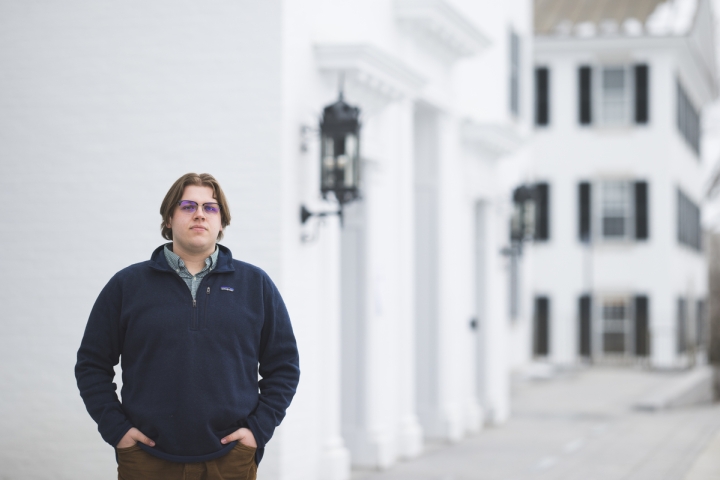Gideon Gruel ’26 has been named a John Robert Lewis Scholar by the Faith and Politics Institute, a Washington, D.C.-based nonprofit that carries on the legacy of U.S. Rep. John Lewis, D-Georgia, the late civil rights leader.
Gruel and his fellow scholars will be the fourth cohort to participate in the Institute’s Scholars and Fellows Program.
It was launched in 2021, a year after the death of Lewis, who founded the Student Nonviolent Coordinating Committee, was beaten at the civil rights march in Selma, and served for 17 terms in Congress.
While the Institute had been sponsoring programs for lawmakers, diplomats, and nonprofit, corporate, and community leaders since 1991, the Scholars and Fellows Program was started to ensure Congressman Lewis’s “mantle is extended to the next generation of leaders,” according to program materials.
Gruel, a double major in philosophy and classical languages and literature who grew up in Washington, D.C., and Idaho, says that his interest in the intersection of faith and politics stems from his membership in the Church of Jesus Christ of Latter-day Saints, as well as his passion for environmental and social justice.
He says he has been inspired by Lewis and by the Rev. Martin Luther King Jr. and his ideas of nonviolence. “They were working at the intersection of politics and religion,” Gruel says. “Their religious beliefs grounded them.”
Along with other scholars from around the country, Gruel will embark on a year-long program that will include a civil rights pilgrimage with members of Congress and two trips to Washington, D.C., where scholars will meet with a variety of leaders in government and from the nonprofit world. Scholars will also complete a year-long oral history project. All scholars receive a $2,000 stipend from the Faith and Politics Institute.
Gruel says that his longstanding interest in the program crystallized this past fall term when he traveled to Jerusalem for an academic exchange program at the Hebrew University of Jerusalem. Gruel had arrived in Jerusalem ahead of other exchange students in order to participate in an Arabic language program and was there on Oct. 7 when Hamas militants launched an attack on Israel. He was safely evacuated and completed the exchange program online.
Gruel says that he hopes to focus his oral history project on a topic related to the Church of Jesus Christ of Latter-day Saints, or on faith and how it influenced the views of Israelis and Palestinians after the events of Oct. 7 and Israel’s subsequent invasion of Gaza.
“I was really struck by how varied the views were,” he says. “After October 7th, a lot of Jewish and Arab students, no matter who we talked to, the way they contextualized October 7th was so varied.”
At Dartmouth, Gruel has served as a peer facilitator for Learning at Dartmouth’s Mindful Academic course and is on the Mock Trial Society team. He has also been involved with the Energy Justice Clinic and says his interest in environmental and climate justice was sparked by the time he spent in Santiago, Chile while serving as a Latter-day Saints missionary. In Chile, he conducted research on the struggle between Indigenous groups and oil companies and the government over land and water rights.
Gruel says he is considering a career in the law and plans to continue to be involved in his church.
“Interfaith work will be one of the most enjoyable parts” of his year as a Lewis scholar, he says. “I really hope to continue to build my interfaith dialogue skills.”
And whatever project he commits to, he says he hopes to “use religion and religious belief to bring people together.”
Students interested in learning about being a John Robert Lewis Scholar or other fellowship opportunities should visit the Office of Fellowship Advising.


